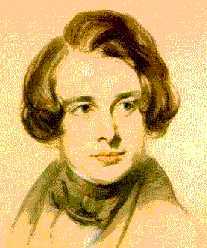Charles Dickens

Personal Background
by John Jennings
Born in Portsmouth in 1812, the second child of a clerk in the Navy, Charles Dickens' background was unlikely to bring him any great opportunities in early nineteenth-century conditions. He had no regular schooling and the reckless life of his father soon caused the family to move to London where they lived in poverty before their father was committed to Marshalsea Debtors' prison. While his parents and the majority of the children lived in the prison, Charles lived outside and worked in a menial occupation which humiliated him.
After his father's release from prison on getting a legacy, Charles again pursued his education after which he worked in a solicitor's office. He wanted to become an actor and this ambition he partly achieved in his final years with the dramatic readings of his works. In 1834 he began work as a press reporter in the House of Commons.
Three aspects of his life can be seen to have had major influences on his work; his experiences as a child-worker living in lodgings without the support of his family; his involvement in the legal profession which brought him into contact with the world of crime and corruption as well as the human problems of individuals and his move to London at the age of ten which brought him to the source of inspiration for much of his literary output.
His marriage had never been a success and there had always been serious conflict which resulted in his separation from his wife in 1858 amid glaring publicity. There were nine children from the marriage, most of whom lived with Dickens after the separation. At this time an affair with an actress was public knowledge and Dickens' public image was adversely affected. In this same year he began the public readings of his novels which attracted huge audiences and fulfilled his theatrical ambitions and his desire for public applause for his work.
Victorian Social Context
The laissez faire economic system and the philosophy of utilitarianism were the two most important aspects of the history of ideas in the Victorian period. According to the laissez faire economists the state should not become involved in the affairs of the individual entrepreneur. The individual could act according to the dictates of his own economic sense and those dictates told him that self-interest is the primary motivation for action and the only key principle on which economic growth depends. Capitalism as an economic system was not seriously questioned before Marx and supporters of the system felt no moral or social responsibility towards the working class or society. There was no reason, in their view, why a worker should be paid a decent wage; no reason why young children and women shouldn't work twelve hours a day in a mine, no reason why the environment shouldn't be destroyed; because anything which conflicted with the profit motives of the employer conflicted with his self-interest and consequently was very bad economics. With the worsening condition of the labouring classes who lived in abject poverty in the slums, social reformers began to see the need for the improvement in their condition.
The social reformers accepted the principles of utilitarianism so that while seeking change they did not question the basic assumptions of free enterprise capitalism. The word 'utilitarian' derives from 'utility' indicating that the degree to which something is useful is a measure of its value. The current form of utilitarianism with which the vast majority are familiar concerns the purpose of education and the modern successors to the Victorians would probably state their case as follows: 'children go to school to be educated so that they can pass examinations and in their own self-interest do better than other students with whom they are competing. If they do well in examinations they will get good jobs so the ultimate purpose of education is to get a job.' Another form of the same theory would say:
Students should learn at school what will be useful to them in a job or in other words schools should be workshops training children so that they will be better able to make profit for their employers and in the process earn a living.
Nineteenth-century utilitarians led by Jeremy Bentham and typified as the nouveau riche entrepreneurs, despised the study of poetry, art or music and dismissed anything concerning the imagination as unworthy and deserving serving of the contempt. This is evidenced in this quotation from Hard Times: 'You can only form the minds of reasoning animals upon facts: nothing else will be of any service to them', we are told in the opening paragraph of the novel.
Utilitarians were responsible for the establishment of the infamous workhouses believing that the poor deserved to be badly fed and forced to work, and accepting the view that people were poor because they were lazy. Utilitarianism was primarily responsible for the attitude adopted towards Ireland during the great famine and was particularly evident in the establishment of public works when starving people were engaged in work for the sake of work since it was virtually immoral to give free food even to a starving person.
In schools using the monotorial system more than four or five hundred pupils could be found in a large hall under the supervision of two or three teachers. Such circumstances demanded a militaristic style of discipline and education was largely a system of drills and dictation with the emphasis on remembering at the expense of understanding. This resulted in students being able to recite factual information in great detail and give accurate definitions.
When reading the works of Dickens, the Brontës, Jane Austen or other nineteenth novelists, we should be aware of the prevailing social and cultural context of the era in which they were writing.
Great Expectations